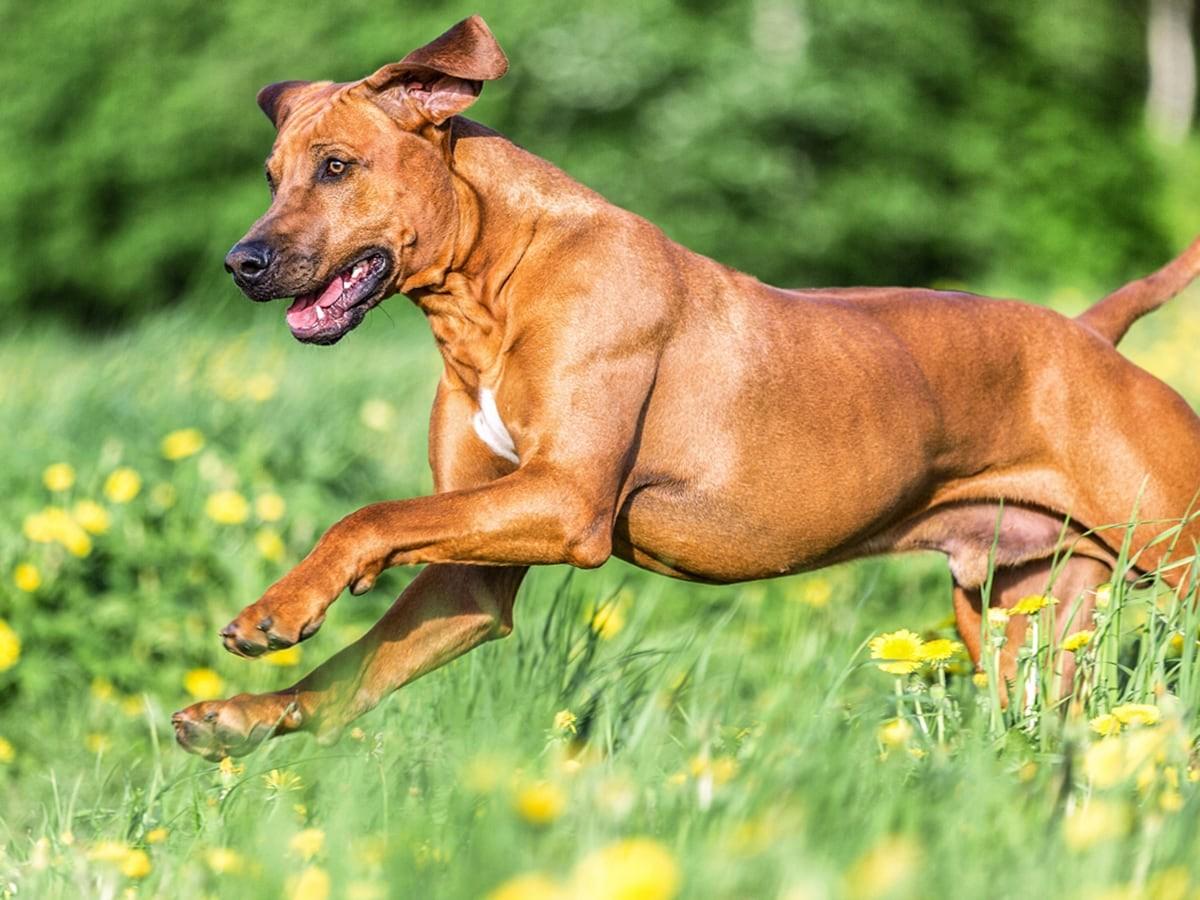
Rhodesian Ridgeback
The Rhodesian Ridgeback breed comes from southern Africa. These dogs are lean, muscular, and known for their trademark fur that grows opposite the rest down their back. A Rhodesian Ridgeback would make an excellent addition to any active family.
Breed Profile
Height
24 – 28
Inches
Weight
77 – 99
Pounds
Life Span
10 – 13
Years
Health
health
Hip Dysplasia
What is it?
This is when the dog’s hip joint grows abnormally and can cause leg lameness and arthritis.
Clinical signs
Symptoms include leg lameness, limping, and a reluctance to move or exercise.
Treatment
Treatment includes weight management like diet and proper exercise. In severe cases medication and surgery are necessary.
Eligible vet bill
$2,000
*Hypothetical reimbursement examples illustrate reimbursement of an eligible vet bill at the noted reimbursement rate, assuming the annual deductible had already been satisfied and the annual coverage limit has not yet been met. Annual deductible, co-insurance, benefit and coverage limits, and exclusions may apply. Eligibility may vary. Visit https://spotpetinsurance.ca/sample-policy for full terms. For Canada enrollments only, reimbursement rate is based on the pet's age.
Personality
Loyal
These dogs are loyal and stick by their owners through thick and thin.
Intelligent
The Rhodesian Ridgeback breed is very smart, helping with training.
Athletic
Thanks to their ancestry as wild African dogs, they are extremely athletic.
Lifetime Care
Coat
The Rhodesian Ridgeback has a short, dense, and glossy coat.
Colors
Colors range from light wheaten to red wheaten.
Hypoallergenic
No.
Grooming
Brushing once or twice a week will help with shedding around the house.
Training
These intelligent dogs need consistent training from a strong owner.
Rhodesian Ridgeback Dog Breed Information
The Rhodesian Ridgeback is a dog breed that comes from the southern African country of Zimbabwe. These dogs are extremely easy to spot thanks to their namesake coat. Running down the back of each Rhodesian Ridgeback is a line of fur that grows against the regular grain of the coat, going from the shoulders to the hips. This is formed by two patterns called whorls (or crowns). It gives the lean, muscular dog a bump or ridge along the spine.
If you’re looking for a loyal companion, the Rhodesian Ridgeback could be for you. These dogs are known to stick by their owners through thick and thin. They’re also extremely smart and can be highly trained with the right owner. However, training needs to be consistent to keep this breed obedient. They’re very athletic pups thanks to their history as wild dogs in southern Africa, they are great runners.
Rhodesian Ridgeback Dog: Introduction to the Breed
Adding a new dog to your home is a big decision. Although your life will change in many ways, keep in mind that the animal’s whole world will change while they adapt to their new home and family. That’s why it’s important to research and reflect on what kind of breed you want before buying. Take the time to think about what traits you want your new puppy to have as well as which traits you’d rather live without. Here are a few things you need to know about the Rhodesian Ridgeback breed.
Rhodesian Ridgeback dogs are usually:
Playful
Assertive
Shy
Are you looking for a pet for your children? Animals are a great way to teach kids values like responsibility, empathy and unconditional love. You may ask yourself, is the Rhodesian Ridgeback a good family pet? The answer is yes. These dogs will love to play with your kids and get their energy out. They do best with older kids who are able to play. As always, children should be supervised with any animal.
These dogs are assertive and know what they want. Although they are intelligent and can be highly trained, they need a strong owner. Consistent training and correct socialization practices help produce a desirable temperament in the dog.
Although these pups are friendly and loving with family members, they usually don’t care much for strangers right away. It’s unlikely that they’ll exhibit aggression or dislike for guests in your home. Be sure to give them a quiet place to retire if new people are entering the home.
What are the Origins of the Rhodesian Ridgeback?
The Rhodesian Ridgeback comes from a former wild dog in the southern African country of Zimbabwe. The first records of the breed occurred when the Dutch visited the region and took note of the dogs with strange marks on their backs. After they were domesticated, the breed was used as hunting dogs.
Today the Rhodesian Ridgeback is gaining popularity throughout the world.
What are the Risks for the Rhodesian Ridgeback Dog?
When it comes to purebred dogs, you won’t come across a breed that’s free from genetic disease due to inbreeding. The Rhodesian Ridgeback is no exception. One of the main problems the breed faces is hip dysplasia. This is when the dog’s hip joint painfully grows abnormally and can cause arthritis or leg lameness. Thankfully there is treatment available. The first line of defense is weight management. This includes a proper diet and exercise. If symptoms get worse, eventually medication and surgery are needed. Here are a few other issues to look out for.
Other Rhodesian Ridgeback health problems could include:
Dermoid Sinus
Degenerative Myelopathy
Hypothyroid
Gastric Dilation Volvulus (Bloat)
Sources:


